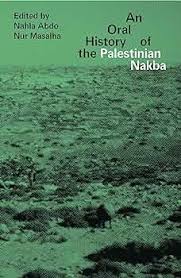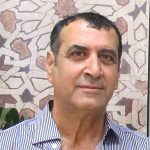An Oral History of the Palestinian Nakba – Nahla Abdo & Nur Masalha (Eds.)

Editor(s): Nahla Abdo & Nur Masalha
Publisher: Zed Books
Year of Publication: 2019
Print Length: 324 pages
Genre: Academic / Essay, Non-Fiction / Cultural Studies, Non-Fiction / History, Non-Fiction / Migration & Refugee Studies
Area: Palestine / Israel
Topic: Colonialism & Post-Colonialism, Epistemology, Feminism, History, Indigenous & Indigeneity, Oral History, Resistance, Woman and Femininity
In 2018, Palestinians mark the 70th anniversary of the Nakba, when over 750,000 people were uprooted and forced to flee their homes in the early days of the Israeli-Palestinian conflict. Even today, the bitterness and trauma of the Nakba remains raw, and it has become the pivotal event both in the shaping of Palestinian identity and in galvanising the resistance to occupation.
Unearthing an unparalleled body of rich oral testimony, An Oral History of the Palestinian Nakba tells the story of this epochal event through the voices of the Palestinians who lived it, uncovering remarkable new insights both into Palestinian experiences of the Nakba and into the wider dynamics of the ongoing conflict. Drawing together Palestinian accounts from 1948 with those of the present day, the book confronts the idea of the Nakba as an event consigned to the past, instead revealing it to be an ongoing process aimed at the erasure of Palestinian memory and history. In the process, each unique and wide-ranging contribution leads the way for new directions in Palestinian scholarship.
Table of Contents
Acknowledgments
Introduction – nahla abdo and nur masalha
Part I: Theorizing the Nakba and oral history
1. Decolonizing methodology, reclaiming memory: Palestinian oral histories and memories of the Nakba – nur masalha
2. Feminism, indigenousness and settler colonialism: oral history, memory and the Nakba – nahla abdo
Part II: Between epistemology and ontology:
Nakba embodiment
3. What bodies remember: sensory experience as historical counterpoint in the Nakba Archive – diana allan
4. The time of small returns: affect and resistance during the Nakba – lena jayyusi
Part III: Archiving the Nakba through Palestinian
refugee women’s voices
5. Nakba silencing and the challenge of Palestinian oral history – rosemary sayigh
6. Shu’fat refugee camp women authenticate an old “Nakba” and frame something “new” while narrating it – laura khoury
7. Gender representation of oral history: Palestinian women narrating the stories of their displacement – faiha abdul hadi
Part IV: The Nakba and 48 Palestinians
8. The ongoing Nakba: urban Palestinian survival in Haifa – himmat zubi
9. Saffourieh: a continuous tragedy – amina qablawi nasrallah
10. The sons and daughters of Eilaboun – hisham zreiq
11. “This is your father’s land”: Palestinian Bedouin women encounter the Nakba in the Naqab – safa abu-rabi’a
Part V: Documenting Nakba narratives from the
Gaza Strip and the Shatat
12. The young do not forget – mona al-farra
13. Gaza remembers: narratives of displacement in Gaza’s oral history – malaka mohammad shwaikh
14. “Besieging the cultural siege”: mapping narratives of Nakba through Orality and Repertoires of Resistance – chandni desai
About the contributors

Nahla Abdo is an Arab feminist activist and a Professor of Sociology at Carleton University, Ottawa, Canada. She is the author of Captive Revolution: Palestinian Women’s Anti-Colonial Struggle within the Israeli Prison System
Source: https://www.plutobooks.com/author/nahla-abdo/
More from Nahla Abdo in this library, click here.

Nur Masalha is a Palestinian historian and formerly Director of the Centre for Religion and History at St. Mary’s University, Twickenham. He is Editor of “Journal of Holy Land and Palestine Studies”: http://www.euppublishing.com/journal/hls, published by Edinburgh University Press. He is the author of many books on Palestine-Israel. His current work focuses on religion and politics in the Middle East, oral history and social memory theory, subaltern studies, new Palestinian and Israeli historiography, the Bible and Zionism, Holy Land toponymy, Jerusalem archaeology, theologies of liberation in Palestine and Life-Long Learning in Palestine.
Source: https://www.soas.ac.uk/about/nur-masalha
More from Nur Masalha in this library, click here.
